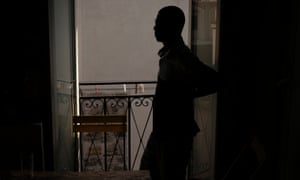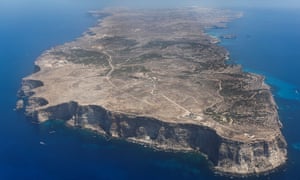The man driving 129 migrants into the sea had no idea how to sail a boat. The traffickers in Libya had given him a compass and, with a gun pointed at his temple, told him to go north.
The Mediterranean was rough: two-metre high waves threatened to overturn the boat. Watching from the back, Mouhamed understood that if somebody else did not take the wheel soon, the sea would swallow them. The 24-year-old volunteered.
Stumbling to the front of the boat, the Senegalese pushed the terrified man from the helm and took command of the sinking craft. Three days later, on the night of 31 July 2016, he and his 128 fellow passengers arrived safely in Italy – “Thanks to a little luck,” he tells the Guardian.
All but one of those onboard were taken to a shelter: Mouhamed Cherif Sane, the man who took the wheel, was arrested for aiding illegal immigration and imprisoned.
They call them “scafisti” – boat drivers – and, according to official figures, Italy has arrested more than 1,500 of them since 2013. Hundreds are being held in prison.
Another four people were arrested in Lampedusa on Tuesday. They are accused of illegally sailing migrants’ boats into the country, and risk sentences of up to 15 years in prison. Yet many of them are nothing more than asylum seekers, victims of trafficking like everyone else.
Mouhamed, who is one of them, still bears signs of the torture he suffered in Libya. “What would you have done in my place?” says Mouhamed, who was made to disembark in handcuffs.
The Guardian has spoken to lawyers, judges and prosecutors involved in the smugglers’ court cases; all confirm that boat drivers are frequently forced to sail at gunpoint. They are released from jail more often now, but the authorities nonetheless continue to arrest them, holding them in prison for months or years.
In a report published in 2017 by Borderline Sicilia, a non-profit organisation that provides legal assistance to lawyers in court cases related to migration, researchers explained how the criminalisation of boat drivers is filling prisons with innocent people who have been turned into scapegoats.
“Smugglers know that once they arrive here they will now be arrested,” says Paola Ottaviano, a lawyer for Borderline, “and have found a new way to transfer people: forcing migrants to drive the boat.”
Borderline’s research shows that “from late 2015, one could find migrants who had been specifically trained as boat drivers – including even minors – subjected to maltreatment, and death threats prior to departure”.
In September 2016, Gigi Omar Modica, a judge at the court of Palermo, took the landmark decision to drop charges of enabling smuggling against two boat drivers.
“After listening to the witnesses and digging a little deeper, I realised that the accused men were not guilty,” said Modica. “The traffickers today can count on a free army: the migrants, in fact. They almost always force boat drivers to sail, sometimes threatening them with a gun. They are scared, undernourished like everyone else.
“The problem is that in Italy [they do] not always take this reality into account, and pretend the so called scafisti act freely and on an equal level with human traffickers.”
Every time a rubber boat carrying migrants arrives in national territorial waters, the police identify a responsible person to justify the illegal entry of passengers. In order to do so, authorities, accompanied by an interpreter, identify some witnesses onboard.
As stated in one recent verdict from a court case in Palermo, migrants who testify against the boat drivers are often granted a permit of stay.
One interpreter told researchers for the Borderline report: “The police sometimes make me translate promises to convince witnesses to provide testimony. There’s very little time, and the alleged boat drivers have to be found immediately.”
Mouhamed considers himself lucky. “I was released after a week,” he says. “But I heard that men charged for the same crime have been released after two years and ended up homeless in the streets.”
Salvatore Vella, the deputy prosecutor of Agrigento says: “I am bound to apply the law. If the boat driver has taken responsibility for the trip, I, as a prosecutor, am required to investigate him. The truth is that in order to capture the real traffickers we need the collaboration of countries in Africa that we do not currently have.”
In May 2016, Italy tried to capture Medhanie Yehdego Mered, considered one of the most powerful traffickers in the world, in Sudan. The extradited man in fact transpired to be Medhanie Tesfamariam Behre, a 29-year-old refugee who milked cows.








